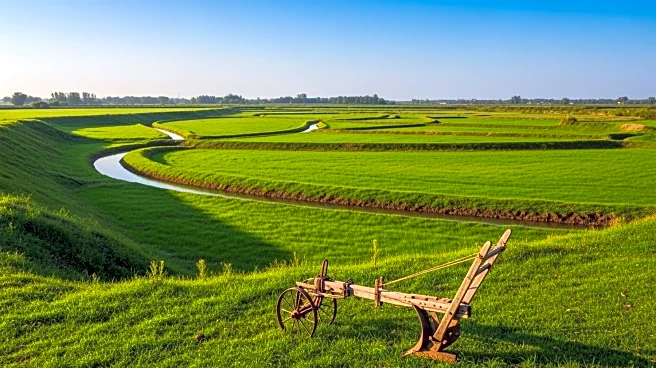What's Happening?
The Food and Agriculture Organization (FAO) of the United Nations is highlighting the importance of traditional agricultural practices as a solution to climate resilience. The FAO has recognized 102 systems globally as Globally Important Agricultural
Heritage Systems (GIAHS), which include practices like Mexico City's chinampas and China's Aohan Dryland Farming System. These systems have sustained communities for centuries by conserving biodiversity and adapting to challenging environmental conditions. The FAO is working to measure the impact of these practices on biodiversity, food security, and climate adaptation, aiming to transform them from conservation efforts into models for climate resilience.
Why It's Important?
The recognition of heritage agriculture systems by the FAO underscores the potential of traditional practices in addressing modern climate challenges. These systems offer sustainable solutions that have been tested over centuries, providing food security and preserving ecosystems. As climate change intensifies, these practices could play a crucial role in global efforts to adapt to environmental changes. By investing in and supporting these systems, countries can enhance their resilience to climate impacts, ensuring food security and sustainable development. The FAO's initiative highlights the need to integrate traditional knowledge into contemporary climate strategies.
What's Next?
The FAO plans to open a new Food and Agriculture Museum and Network to further promote the link between food, culture, and tradition. This initiative aims to connect communities and inspire global audiences by showcasing diverse agricultural traditions. The FAO is also working with member countries to develop frameworks for measuring the outcomes of heritage agriculture systems, raising awareness, and attracting investment. These efforts are intended to ensure that recognized systems become living laboratories for climate resilience and food security, backed by long-term support and investment.
Beyond the Headlines
The FAO's focus on heritage agriculture systems highlights the ethical and cultural dimensions of climate adaptation. By valuing traditional knowledge, the initiative challenges the notion that high-tech solutions are the only answer to climate resilience. It emphasizes the importance of cultural heritage in sustainable development and the need to protect these practices from urbanization and environmental degradation. The FAO's approach could lead to a shift in how agricultural innovation is perceived, recognizing the value of historical practices in shaping future strategies.















